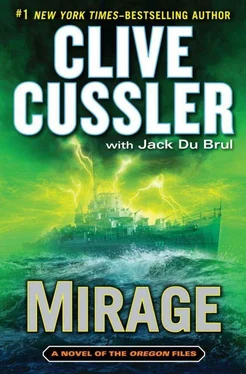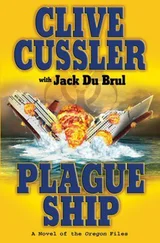Then all at once, as he knew it would, the submersible erupted from the net, freeing itself of the last of the ropes and vanishing upward in the blink of an eye.
Cabrillo wasted no time watching it. He swam over to the far side of the wreck, dropped down to the bottom, and crawled as far from the ship as he could. He had to thrust his hands into the silt to keep from being blown away by the current.
The second torpedo augured into the seafloor well short of its target. Because he was shielded by the ship’s hull and was lying flat on the bottom, the pressure wave mostly expanded over him, but he still caught enough to have the air forced from his lungs in an explosive breath that almost unsealed his dive helmet.
He thought he’d survived the worst of it when a second pressure wave hit, and this time it peeled him off the bottom and sent him tumbling. The current grabbed at him immediately, and he was soon bouncing along the bottom at a stiff four knots.
If he had any chance of being rescued, he needed to stay with the wreck. It was the only logical place Max would search for him. If he tumbled past it, there was no way he’d be able to fight the current to return. He didn’t have anywhere near enough air to surface using proper decompression stops. And an ascent without them would lead to a fatal dose of the bends. His joints would constrict as the nitrogen in the tissue dissolved out, and he would die in unimaginable agony.
He managed to flatten himself into a proper swimming position. He knew he couldn’t fight the current, so he didn’t even try. Like someone caught in a riptide, he swam at an angle to the current instead of fighting it directly, vectoring off some of the brute force of the water rushing past him. He was certain that the current had already kicked him north of the hulk, but he had a slim chance of finding the wavering remains of the fishing nets that trailed off the ship like a bride’s train.
His legs began to burn as he kicked with everything he had. He wouldn’t let himself consider that the nets had been ripped clean off the old wreck by the second torpedo. He swam hard, battling a current he couldn’t defeat, burning through his supply of trimix at a prodigious rate. He fought the growing agony of cramped muscles filling with lactic acid, groaning aloud inside his helmet. The rip and saw of his breathing filled his head with the sounds of desperation.
This was how he would die, clawing his way across the bottom, sensing the net was just outside of his visual range and feeling that if he could just keep going another handful of seconds he would reach it.
And then he actually saw it, waving in the current like the arms of a giant jellyfish. He could also see that he was approaching the very end of the ensnared mass of nets. He had only fifteen feet to swim, but there was only ten feet of net before he was swept past it. If he missed, death was the only option.
Cabrillo doubled down. His feet kicked in a flurry of motion, but not giving up any efficiency. He thrust with his arms, his gloved hands curled into perfect paddles that pulled him against the Gulf Stream. He adjusted his angle slightly, forcing himself to fight even harder in the face of the current but knowing he’d been coming in too shallow and would miss.
He reached out. Inches. That was all he needed. He roared as the tips of his fingers brushed the old netting just at its very end. They scrambled to find purchase, but the net was covered in marine slime that was as slick as grease.
There, he finally grasped the second-to-last opening in the net only to have the rotted line snap off in his hand. He clutched at the last bit of rope and prayed, because he could swim no more. The net would either support the extra drag of his body clinging to it or it wouldn’t and he’d be lost.
He stopped kicking, and the old fishing net held his weight. He pulled himself up so he could grip it with both arms and willed his breathing to slow, and the adrenaline began to filter out of his bloodstream. He clung there, panting, knowing he was still in a precarious position but unable to find the strength to move. The net was floating, gently undulating, in the current, so when he felt a sudden jolt he knew something was wrong. He grabbed his more powerful handheld light and flashed it up the net. The lamp revealed it was tearing. His weight was too much for the rotten old sisal lines.
He started climbing up the net against the current, his head down and his shoulders and arms doing all the work.
The net lurched again as more of it parted. He was scrambling now. He recalled climbing cargo nets at the CIA’s training facility as part of an obstacle course, but it was nothing like this. The press of the current against his body and bulky gear dwarfed the gravity he’d fought back then. And unlike those training sessions, he couldn’t use his feet because his flippers would get in the way and he couldn’t afford the seconds it would take to slip them off.
The net tore completely free just as he reached a still-stable section. The current sucked the detached piece out from under him. It snagged against his weight belt, and for a moment it pulled on him with the strength and tenacity of a pit bull. His grip was just about to slip when the net unsnagged and vanished behind him.
Not allowing himself time to recover, he continued climbing up the net, scrambling in a mad dash to the safety of the wreck’s shattered remains. It was a two-hundred-foot climb. Once he felt the net was safe enough, he removed his flippers and clipped them to his dive harness and took a few moments to let his feet take the strain off his arms.
He gave himself just three minutes’ rest before continuing on, though now it was his legs providing most of the heavy lifting and he made good time.
The mine tender was unrecognizable as a ship. The glow from his headlamp and his dive light revealed the ship had been blown into scrap by the first Russian torpedo, and a lot of its remains had been buried under a blanket of sand kicked up by the second. Chunks of hull plating lay strewn across the seafloor. He identified part of the ship’s funnel only because of its distinct stovepipe shape. He saw no sign of the cage Tesla had enshrouded the ship with or the strange machine he’d discovered in the vessel’s hold.
It was a miracle that the net had remained snagged on what little of the superstructure survived the explosion. He found a spot in the lee of a ruined boiler and settled to the bottom, finally able to take a proper rest.
Because the submersible acted as a relay for their communications, he knew it was pointless to try to raise the Oregon . The distance to the surface was just too great for his gear, but the main problem was that the mini-sub’s hull section became deaf and mute once it detached from the propulsion sled.
He powered down his helmet light to conserve the battery. He was trapped on the bottom of the sea, as unable to change his predicament as an astronaut who becomes separated from his space capsule. Juan could do nothing but rely on his crew to save him. His faith in them was boundless, but rescues take time. They would need to recover the submersible first, and only then would Max discover that he was still down here. Next they would need to organize recovery gear and send down either Little Geek or the Discovery 1000, the second, smaller mini-sub the Oregon carried. It all took time.
The vast ocean crushed down on him from above, a lone man sitting on the seafloor among the rusted ruins of a dead man’s dream, a lonely pinprick of light in a stygian darkness as vast as the cosmos. Juan, feeling the cold start to seep into his skin, finally looked at his remaining trimix supply, nodded grimly, and put out his dive light so that the black crushed up against his dry suit.
Читать дальше












